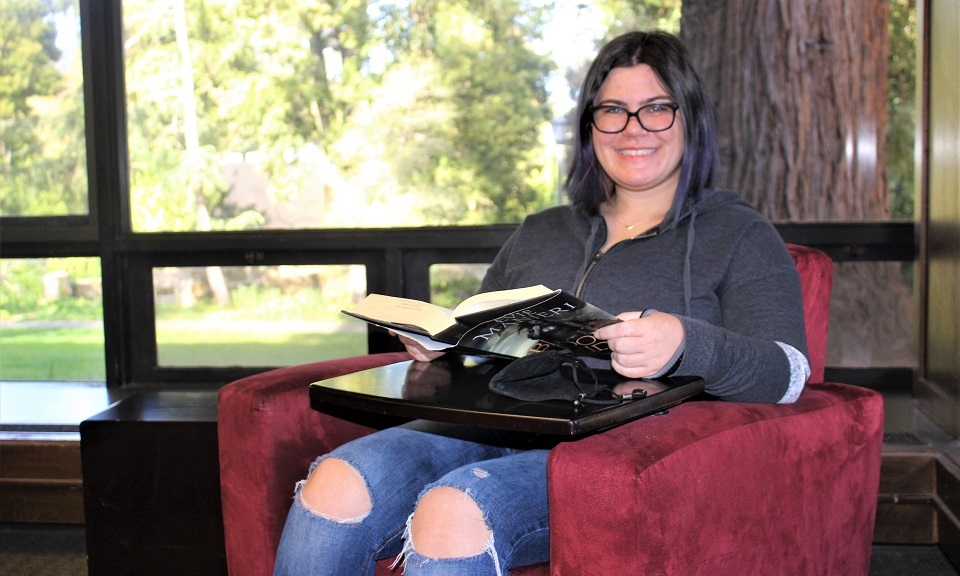Breadcrumbs
- News
- News Archive
- Student's Research Offers `New History' For NCUR Presentation

Abby Gordon ‘22 was doing research for her senior thesis while she was on duty as a Resident Advisor at Dominican University of California late one night last October when she stumbled upon a key source of information. So thrilled, Abby couldn’t help but want to share the news. She spontaneously emailed her history professor Dr. Jordan Lieser.
“I wasn’t very tired, and I was kind of on a roll in terms of research,” she says. “I emailed Jordan because I needed to tell someone about what I had found.”
To her amazement, Abby’s email was soon returned. Dr. Lieser, who was awake at home doing research of his own, heard the email notification ping on his smart phone and conversed with her the next day. Abby, who plans to attend graduate school to further study the history of medicine and science, is researching the history of Sexually Transmitted Infections (STI) in Latin America is the mid-1940s.
“Abby had discovered a connection between the STI trials in Guatemala and another famous set of medical trials in the United States. I couldn't wait to respond to her. It is an incredibly exciting discovery,” he says. “We had a full discussion about the implications right then and there. Considering what this meant for her project. I could feel the excitement and passion for her research as I read her words.”
This student-faculty connection is another example of how supportive and responsive Dominican professors are with their students, no matter the topic or time of day. That kind of collaboration is a theme as five Dominican history students, including Abby, prepared to present virtually at the National Conference of Undergraduate Research (NCUR) April 4-8.
EXPLORE OUR UNDERGRADUATE PROGRAMS
“In Dominican’s history program, we emphasize doing history,” Dr. Lieser says. “Faculty and students work together to build up this skill set with the goal of creating original historical research. Abby has consistently excelled in this central feature of our curriculum, but her current project, a study of U.S.-led STI medical trials in Guatemala, is something special. She is investigating a complicated and largely unrecorded history. In the process, she uncovered new sources of information and will likely change the way we think about the history of STI research. Truly, Abby is producing graduate level work as an undergraduate.”
Abby learned about Dominican from a high school chemistry teacher, Bridget Gengler, who earned an MS in biology at Dominican in 2010. Abby first met Dr. Lieser at an Admitted Students Day on campus where he introduced himself and had lunch with Abby and her parents. A Freedom High School graduate and daughter of a high school teacher, Abby’s goal is to be a teacher, too. In addition to majoring in history in the School of Liberal Arts and Education, she has minors in mathematics and chemistry and Dr. Lieser encouraged her to take a Latin American history class and produce a medically-related paper that would encompass all her interests.
From that paper, the idea for Abby’s senior thesis was born.
“You will find there is a whole lot of nothing written on my topic,” she says. “I had no idea where to start and I don’t remember what I searched that finally got me the answer and got me going.”
Eventually Abby locked onto a source -- "Ethically Impossible" STI research from 1946-48 in Guatemala. It was a 200-page report.
“I couldn’t believe what I was reading. It was fascinating and extremely inhumane,” Abby says. “A lot of the inoculation methods used were dangerous and brutal and unnecessary.”
At Dr. Lieser’s urging, Abby widened her research focus. She looked back at mug shots and records of women in Sacramento who were arrested on suspicion of having a STI. One, Abby said, was arrested for being “in the same room as a soldier.” There were stories of women being beaten, quarantined and sterilized. Abby also discovered data of a study on STI in a prison in Terre Haute, Indiana that was deemed a failure. The same researchers, however, moved the trials to Guatemala, where prostitution is legalized, in order to use normal exposure as an inoculation method.
“An integral part of this history are the Terre Haute trials, as it highlights the change in mindset from one trial to another,” Abby says.
Abby learned of another STI study in Tuskegee, Alabama that had a connection to serology testing in Guatemala. Serology testing examines antibodies in biospecimens which, Abby discovered, became a lucrative business to access and obtain post World War II when testing went beyond soldiers to people getting tested after birth or before getting married.
“I’ve learned a lot of fascinating things over the scope of this research, but that was the one thing that really stood out to me,” Abby says, “It was wild.”
It’s been a revelation for Abby. She spent a full year researching STI history and this month turned in the first raw draft of her senior thesis to Dr. Lieser. It’s tentatively entitled “Venereal Disease Vs. Morality: U.S. sanctioned STI Trials in Guatemala in 1946-48.”
“The history of science and medicine is an exciting field to be a part of and Abby is contributing to it right now,” Dr. Lieser says. “Her project is a topic that has barely been covered by historians, so her research is potentially uncovering `new history’.”
Abby hopes Dr. Lieser will help her turn her thesis into a paper to be published in a journal someday.
“I want this topic to be more talked about,” Abby says. “It’s a topic people need to know about and hear about.”